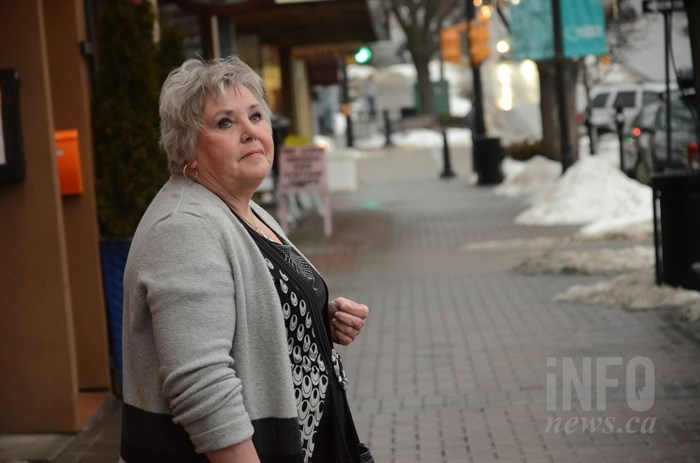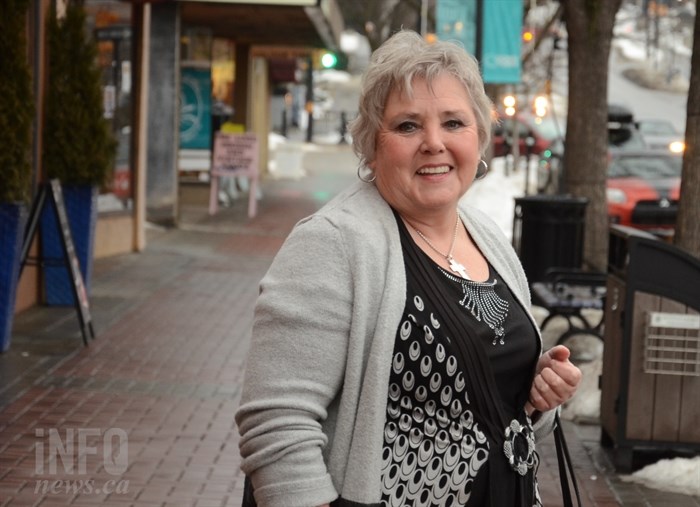
Christine Thelker.
(BEN BULMER / iNFOnews.ca)
March 01, 2020 - 12:00 PM
Christine Thelker sits on the board of directors of an international charity. She spoke in New York at the United Nations last year and is heading to Singapore for an international conference next month. She also has a book coming out in the summer.
She also has dementia.
"Years ago I would have been known as crazy aunt Mary because they didn't know what it was," Thelker said. "They wouldn't look at it in younger people... dementia was thought to be an old person's illness."
Widowed at 47 years old, Thelker was just getting comfortable with her new reality when her whole life changed again.
"I had a stroke while I was at work," she said. "And that started the whole domino effect."
Shortly afterwards she was diagnosed with dementia. She was 55.
"You're basically told to go home and get your affairs in order," Thelker said.
Doctors told her there was nothing they could do for her and she had five to eight years left to live.
"I went home to an empty house to absorb all that," she said.
That happened five years ago.
Sitting in a warm and cozy cafe in downtown Vernon, Thelker tells her story elegantly. She's friendly and warm, cracks jokes and laughs a lot. She apologizes and says sometimes she can't find the right words, but through our hour-long conversation, it's only barely noticeable once.
Thelker calls herself the new face of dementia and clearly breaks the stereotype of how most people view dementia. She's also on a mission.
She sits on the board of Dementia Alliance International, an international not-for-profit advocacy group operating in 49 countries and run solely by people with dementia.
"We want to change the stigma," she said. "People are so afraid of dementia. They don't realize if they change how they treat it and how we're treated overall... we can stay well within our communities, we don't have to be locked up in nursing homes."
Care homes need to reevaluate dementia wards, more support needs to be provided for younger people with the disease, families need to be better educated, people need to be less terrified of it, the list goes on.
"You just hear horror story after horror story, nobody ever says 'yes it's awful but you can still live with it,'" Thelker said.
Five years after her diagnosis Thelker gives a lot of credit to her two doctors for her health and believes without them she may have declined to the point of being in a facility.
"They really encourage me in my advocating because those things give me hope and purpose," she said.
She stresses not everyone is as fortunate.
Thelker said while services for older people with dementia are lacking, for early-onset dementia - diagnosed in 40- and 50-year-olds - the situation is worse. Statistics also show the number of people with dementia is growing.
Dementia is an umbrella term for progressive degenerative brain syndrome, which includes Alzheimer's. According to the World Health Organization, about 50 million worldwide have dementia and the number is expected to triple by 2050. In Canada, there are 564,000 people living with dementia and that number is expected to almost double in the next 15 years. Statistics are harder to find for people under 65 living with dementia, but the Canadian Alzheimer Society estimated there are 16,000 under 65 living with the disease.
In a bitter twist, Thelker spent her career working with people with dementia before her diagnosis. After she was diagnosed, she wasn't given the opportunity to continue working. With the loss of her job came the loss of her home. She believes with the right support in place, she could have continued in her work at around 60 to 70 per cent capacity.
"When you tell someone they have a terminal illness and there is no hope for them and send them out the door to go home, it's not OK," she said. "We need to be able to show people there is hope."
And things are changing, albeit slowly. Thelker works at HomeSense four to six hours a week. She said the company has been wonderful.
"(Working) helps me financially, (work) helps me cognitively because it keeps my brain engaged, it helps me emotionally because it keeps me socially interacting," she said.
Thelker lives alone and still drives, has daily online meetings and works hard in various aspects of her advocacy.
As she sits and talks about the ethical implications of locking dementia patients in secure units, "(it's) against a person's human rights" before moving on to discuss the damage families can cause by slowly taking a person's autonomy away, it's easy to forget about Thelker's illness.

Christine Thelker
(BEN BULMER / iNFOnews.ca)
However, she says her reality is not pretty.
"Just because I'm not fitting your picture (of a person with dementia) doesn't mean my reality isn't very much what it is," she said. "Our reality is we're fighting hard every waking minute of the day."
Things that used to take her 20 minutes now take hours. An endless stream of alarms and technology enables her to keep her day-to-day in order. And while she accomplishes a lot, it takes its toll.
Throughout it all she wants to advocate for people with dementia, to change society's attitude.
"We have people living well 20 years later, we have people who are 40, people who are 80, they're alive and they're vibrant... we're not sitting at home wallowing," she said.
Due to be published in the summer, For this I am Grateful may sound like an unusual title for her book, but she begs to differ.
"I live with a terminal illness but I'm grateful for so much, it closed a lot of doors in my life but through it, whoever thought little old me from Vernon would speak at the United Nations or in Chicago or now Singapore in my effort to help others?"
"I'm not unhappy in my world, my world operates very differently from what my pre-dementia life did, but I'm not unhappy," Thelker said.
It seems crass to ask her about the future, although she brings it up anyway.
"The reality? The clock is running fast," she says. "I'm doing absolutely everything in my power to keep me here because I also know the reality is once you go into a home, the clock is put on fast-forward because they take away all of your abilities."
"That's my fear, I'm not scared of dying, I'm scared of not being allowed to live."
For more information on Dementia Alliance International go here.
Christine Thelker can be found on Facebook at Chrissy's Journey here.
A GoFundMe campaign raising money for Dementia Alliance International can be found here.
To contact a reporter for this story, email Ben Bulmer or call (250) 309-5230 or email the editor. You can also submit photos, videos or news tips to the newsroom and be entered to win a monthly prize draw.
We welcome your comments and opinions on our stories but play nice. We won't censor or delete comments unless they contain off-topic statements or links, unnecessary vulgarity, false facts, spam or obviously fake profiles. If you have any concerns about what you see in comments, email the editor in the link above.
News from © iNFOnews, 2020